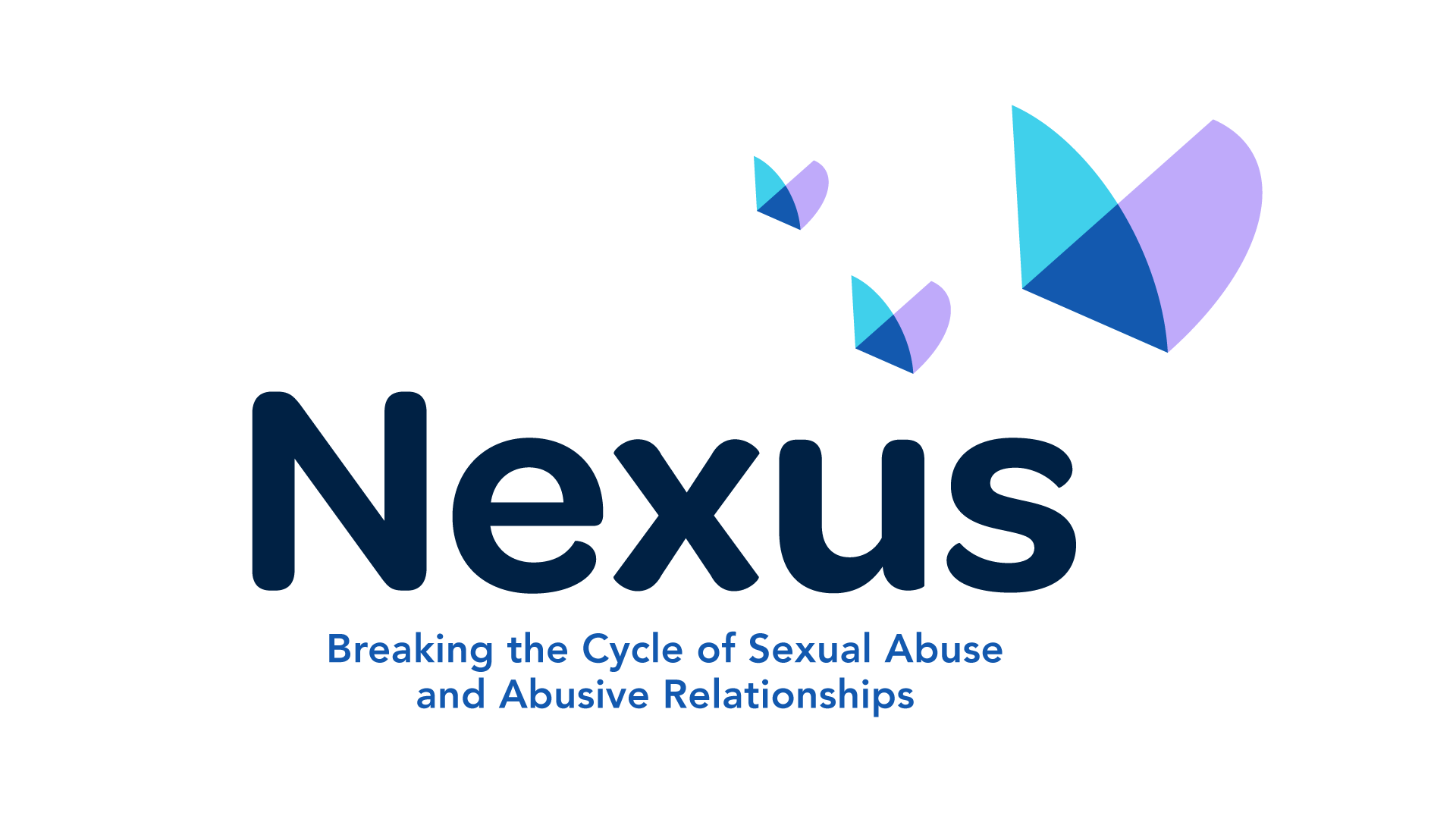Additional Support
Self help resources for survivors of sexual abuse
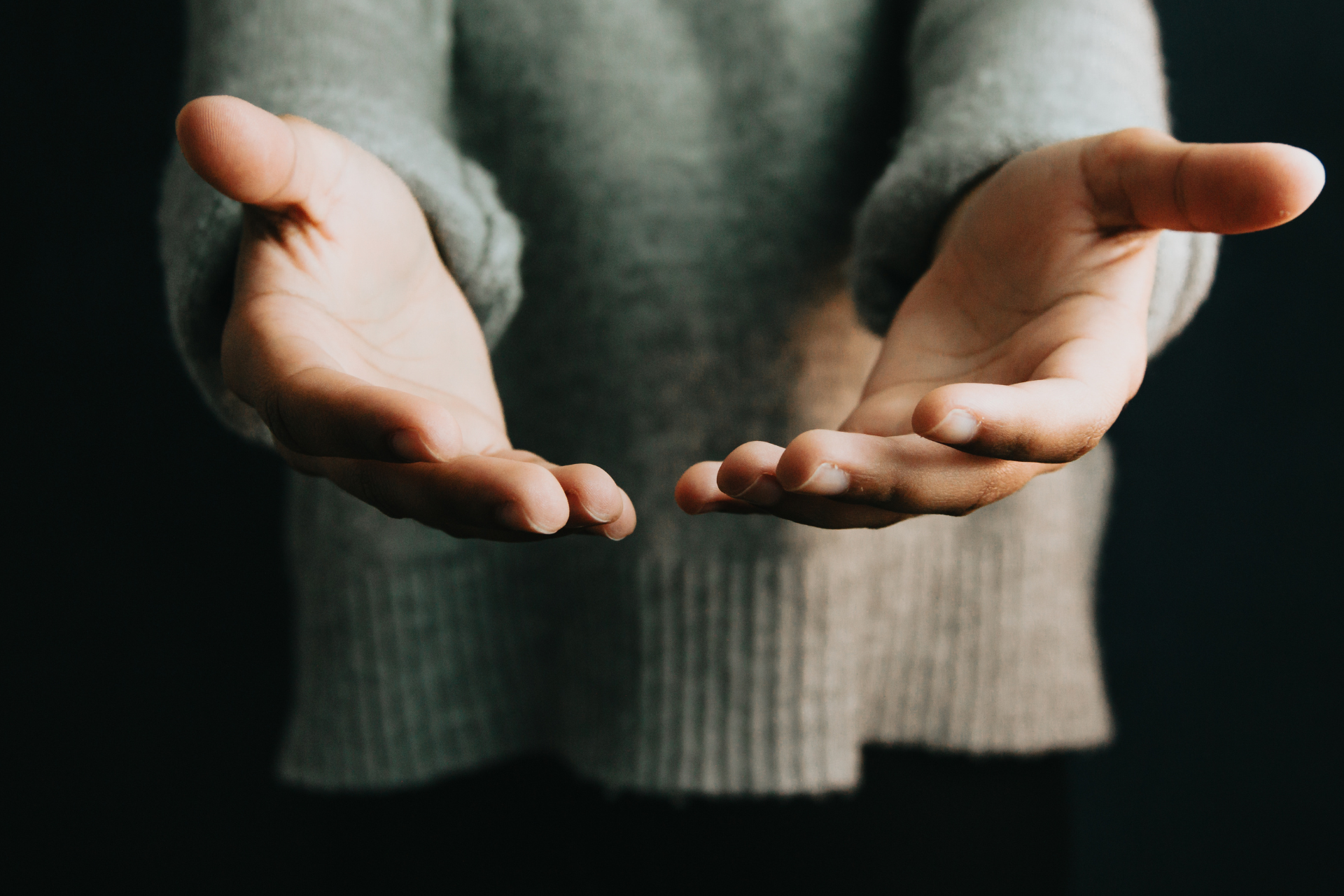
Additional Support
Self help resources for survivors of sexual abuse

Self help resources for survivors of sexual abuse
Accessing self help resources can be useful for survivors of sexual abuse who may be waiting for counselling or other support to begin, those who may not be ready to start counselling or other therapeutic interventions, or those who have completed their counselling journey. At Nexus, one of our core values is empowerment, which means we are committed to supporting people impacted by sexual abuse and abusive relationships to recognise their strength and ability to make informed choices and create positive change.
We have collated a range of self help resources to support survivors of sexual abuse and abusive relationships. Take a look through these resources below to find the ones that suit you best.
Useful resources for survivors of sexual abuse
There are a range of self help resources for survivors of sexual abuse and abusive relationships available online and offline. We have compiled a list below of links to books, guides, websites, mobile apps, and podcasts, from other sources which you may wish to explore. This list is in development and will continue to be updated.
Remember, if you feel like you need to speak to someone, the Domestic and Sexual Abuse Helpline is available 24 hours a day, 7 days a week, every day of the year for anyone impacted directly or indirectly by sexual abuse and abusive relationships. Nexus manages the Helpline on behalf of the Departments of Communities, Health, and Justice. You can call our trained operators on 0808 802 1414, email help@dsahelpline.org, or live chat at dsahelpline.org completely free of charge. If you are in in distress or crisis, you can contact Lifeline 24/7 on 0808 808 8000.
Resources for adult victims of child abuse
Self-care for survivors of rape and sexual abuse
Coping strategies for people impacted by sexual abuse
Self-help resources for general wellbeing
Resources for survivors of sexual abuse
Mobile app to help with sleep, anxiety & stress
Self help guide for survivors of rape or sexual abuse
More resources coming soon…
Take 5 Steps to General Wellbeing
Most of us know when we are mentally and physically well, but sometimes we need a little extra support to keep well.
There are five simple steps to help maintain and improve your wellbeing. Try to build these into your daily life – think of them as your ‘five a day’ for wellbeing.

Connect

Be active

Take notice

Keep learning
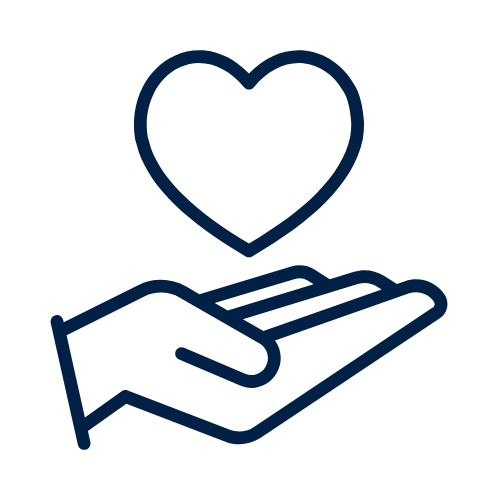
Give
Techniques to help you relax
You can use these exercises when you’re feeling stressed, busy or worried:
Some of these exercises might not work for everyone, so don’t worry if one technique isn’t right for you. You could try a different exercise instead.
How to use relaxation exercises:
You can use relaxation techniques regularly, or every once in a while. Do whatever feels right for you.
- Try and make some time in your day to try these exercises. Don’t treat relaxing like a task that needs to be completed. Try to think of it as giving yourself some time and space.
- Find somewhere quiet and comfortable where you won’t be interrupted, if you can.
- Try to make sure your surroundings are at the right temperature. It can be hard to relax if you’re too hot or cold.
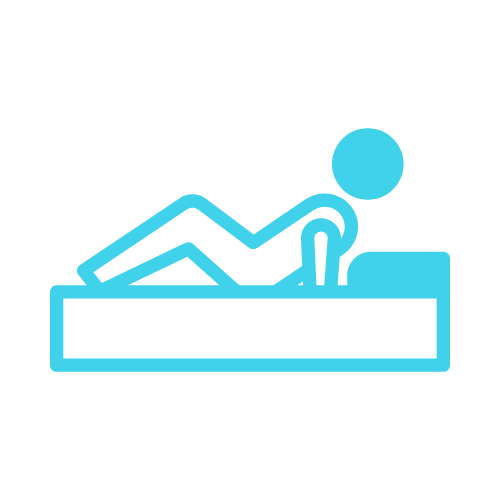
Relax your body

Get creative
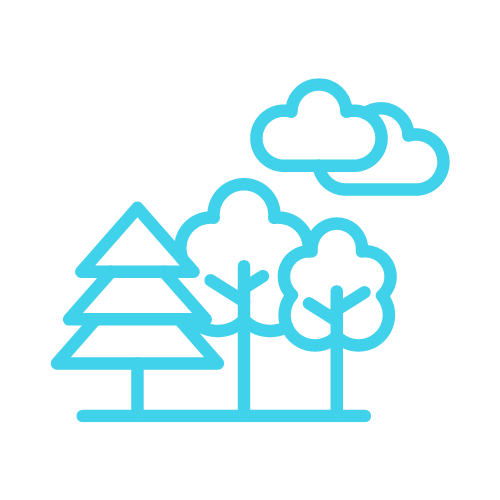
Mindful moments in nature
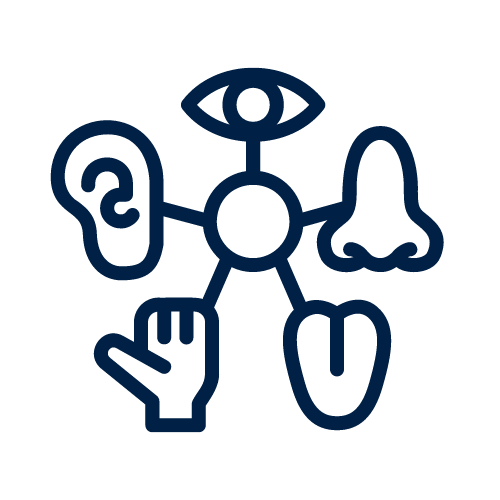
Connect with your senses
Connect
Connect with the people around you: family, friends, colleagues and neighbours at home, work, school or in your local community. Think of these relationships as the cornerstones of your life and spend time developing them. Building these connections will support and enrich you every day.
Good relationships are important for your mental wellbeing. They can:
- Help you to build a sense of belonging and self-worth.
- Give you an opportunity to share positive experiences.
- Provide emotional support and allow you to support others.
There are lots of things you could try to help build stronger and closer relationships. Take a look at our suggestions in the diagram.
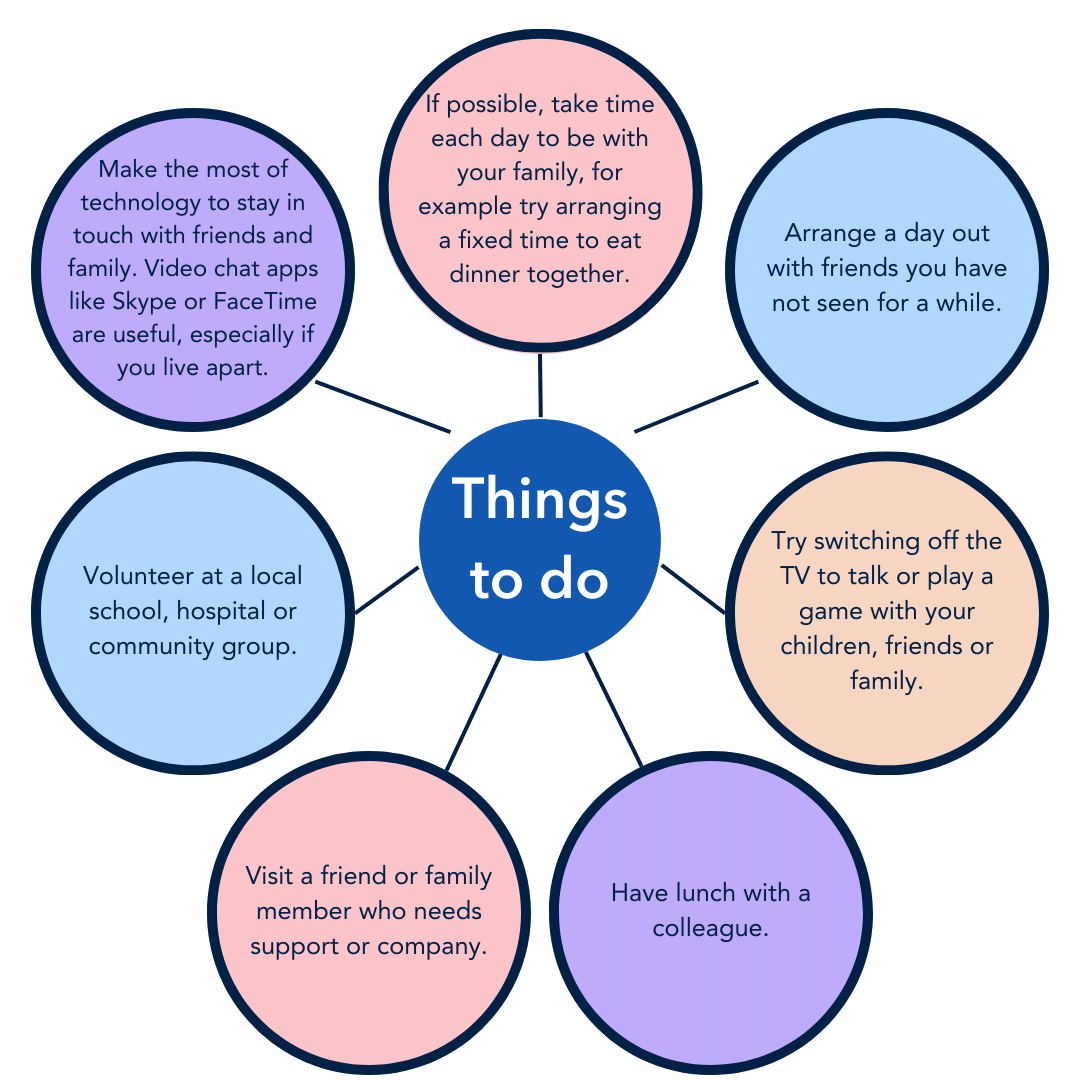
Be active
Go for a walk or run, cycle, play a game, garden or dance. Exercising makes you feel good. Most importantly, discover a physical activity that you enjoy; one that suits your level of mobility and fitness.
Being active is not only great for your physical health and fitness. Evidence also shows it can also improve your mental wellbeing by:
- Raising your self-esteem.
- Helping you to set goals or challenges and achieve them.
- Causing chemical changes in your brain which can help to positively change your mood.
Things to do
- Read about running and aerobic exercises to help get you moving and improve your fitness.
- Read about strength and flexibility exercises to increase muscle strength, improve balance and reduce joint pain.

Take notice
Be observant, look for something beautiful or remark on something unusual. Savour the moment, whether you are on a bus or in a taxi, eating lunch or talking to friends. Be aware of the world around you and what you are feeling. Reflecting on your experiences will help you appreciate what matters to you.
Paying more attention to the present moment can improve your mental well-being. This includes your thoughts and feelings, your body and the world around you.
Some people call this awareness “mindfulness”. Mindfulness can help you enjoy life more and understand yourself better. It can positively change the way you feel about life and how you approach challenges.
Take a look at our ‘Connect with your senses’ exercise below. You can also read about mindfulness at your local library or online.
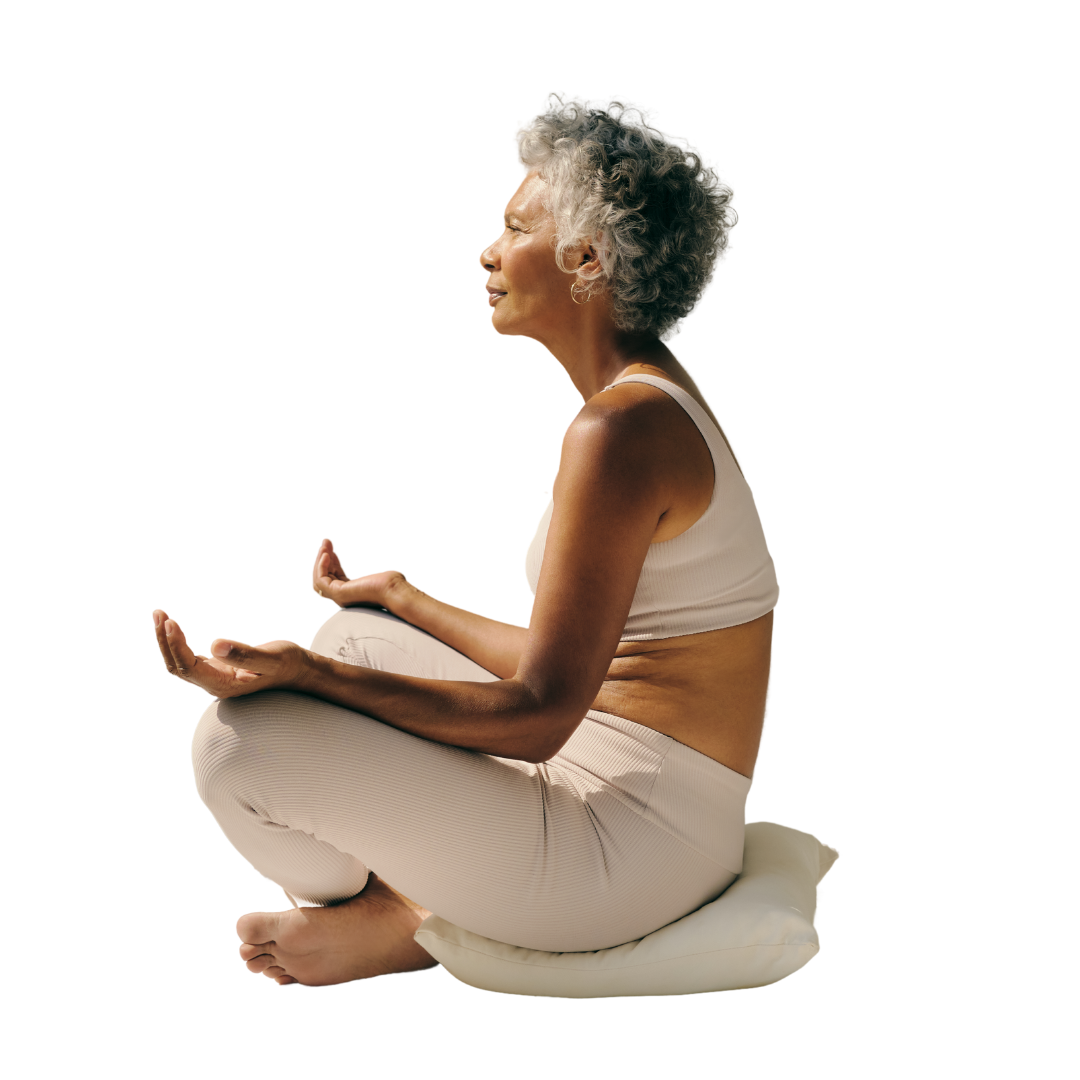
Keep learning
Don’t be afraid to try something new, rediscover an old hobby or sign up for a course. Take on a different responsibility, fix a bike, learn to play an instrument or how to cook your favourite food. Set a challenge you will enjoy. Learning new things will make you more confident, as well as being fun to do.
Research shows that learning new skills can also improve your mental wellbeing by:
- Boosting self-confidence and raising self-esteem
- Helping you to build a sense of purpose.
- Helping you to connect with others.
Even if you feel like you do not have enough time, or you may not need to learn new things, there are lots of different ways to bring learning into your life.

Some of the things you could try include:
- Try learning to cook something new. Find out about eating a healthy, balanced diet.
- Try taking on a new responsibility at work, such as mentoring a junior staff member or improving your presentation skills.
- Work on a DIY project, such as fixing a broken bike, garden gate or something bigger. There are lots of free video tutorials online.
- Consider signing up for a course at a local college. You could try learning a new language or a practical skill such as plumbing.
- Try new hobbies that challenge you, such as writing a blog, taking up a new sport or learning to paint.
Give
Do something nice for a friend or stranger, thank someone, volunteer your time or consider joining a community group. Look out as well as in. Seeing yourself and your happiness linked to the wider community can be incredibly rewarding and will create connections with the people around you. It could be small acts of kindness towards other people, or larger ones like volunteering in your local community.
Research suggests that acts of giving, and kindness can help improve your mental wellbeing by:
- Creating positive feelings and a sense of reward
- Giving you a feeling of purpose and self-worth
- Helping you connect with other people.
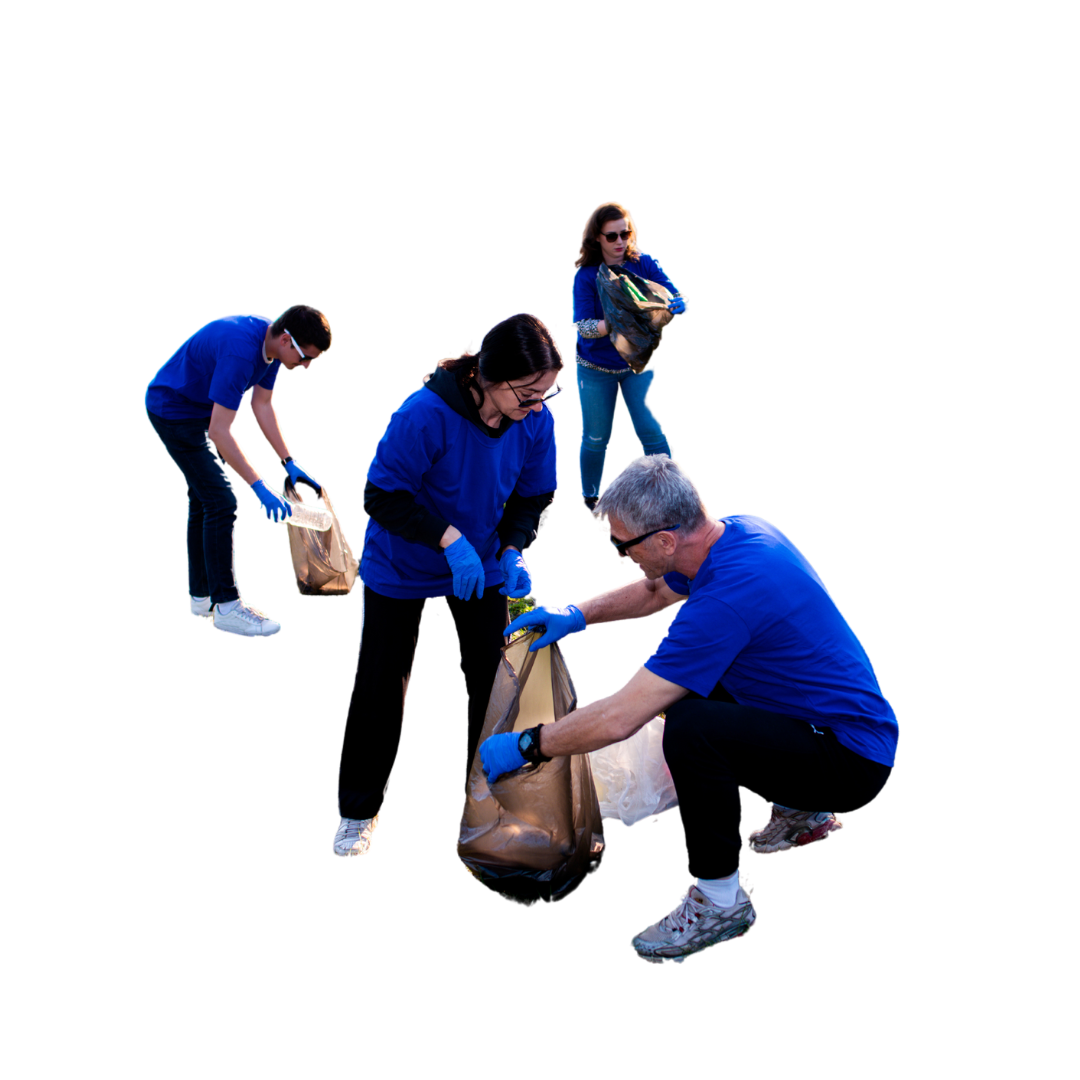
Some of the things you could try include:
- Saying thank you to someone for something they have done for you.
- Asking friends, family, or colleagues how they are and really listening to their answer.
- Spending time with friends or relatives who need support or company.
- Offering to help someone you know with DIY or a work project.
- Volunteering in your community, such as helping at a school, hospital or care home.
Relax your body
When you’re stressed your muscles can become tight and tense. This exercise helps you notice tension in your body and relax your muscles.
You will need:
- Somewhere comfortable to sit or lie down
- Space where you won’t be interrupted.
What do I do?
- Lie down or sit with your back straight and your feet on the floor. Close your eyes or focus on a spot in the distance.
- Start by clenching your toes as much as you can for a few seconds then releasing them. Notice the difference between the two feelings.
- Match this to your breathing. Tense your muscles as you take a deep breath in and relax as you breathe out.
- Move up your body to your thighs, your stomach and all the way to your shoulders and hands, clenching and relaxing each muscle in turn. Take time to notice any parts of your body that feel tense, tight, or tired. You can repeat if you still feel tense.
- Take a moment to relax, then slowly and gently begin to move. When you feel ready, you can stand up slowly.
Variations
- Instead of tensing your muscles, try placing something warm on each part of your body in turn. Draw calming circles.
Get creative
Colour, creativity and movement can help you feel relaxed by:
- Distracting you from worrying thoughts.
- Giving you an outlet and focus for your emotions.
- Stimulating your senses.
You will need:
- A table, desk, or other flat surface
- Blank paper
- Pencils, pens or crayons
- Sticky tape or masking tape to hold your paper down (optional)
What do I do?
- Make sure you are sitting comfortably with your feet firmly on the floor, your back straight and your shoulders relaxed.
- Take your paper and pencil and draw a circle that fills most of the page. It doesn’t have to be neat.
- Now keep drawing. You could keep going over the circle, or fill it with a pattern, but try not to let your pencil leave the page. Don’t worry about creating a finished picture, just keep going.
- Take time to focus on what you’re drawing. Focusing on these sensations can help you quieten your mind.
- Once you have done this for a few minutes, try using a different colour or pattern.
Variations
- If you’re focusing too much on getting the pattern right, try using your other hand.
- If you find it hard to get started, try using a colouring book.
Take a mindful moment in nature
Mindfulness is a way of paying attention to the present moment. Spending time in outdoor green spaces has been found to reduce stress, anxiety and depression.
Follow these steps for a new way to experience your surroundings. This can also be a chance to get some gentle exercise, if you would like to and feel able to.
What do I need?
Just yourself and a green space. Try a local park, woodland, nature reserve or garden, if you have access to these. (Note: we understand that going outside and being in these sorts of spaces may be triggering for various reasons, if this is the case for you, you could try to follow the steps below inside in a place that feels safe for you, or follow another one of our suggestions.)
What do I do?
- Find a green space. When you get there, stop for a moment and take a deep breath.
- Start exploring slowly. Try not to focus on getting somewhere in particular. Really focus on any movement you make. If you’re walking, notice which part of your foot touches the ground first, and feel the transfer of weight through your foot.
- Notice the ground underneath you. Is it grass or earth? Does the ground feel soft? What colours can you see?
- Think about the rest of your body. How are you holding your arms? Does the air on your face feel cold or warm?
- Listen to the sounds around you. Can you hear birdsong, or wind rustling through the leaves?
Variations
- If you can’t go to a green space, you can try opening your window and noticing what’s around you. Notice any clouds in the sky, or trees and plants you can see. Can you feel rain, wind or sun on your skin?
- You could try looking after a plant. Spend time focusing on its scent, shape and texture. You could try touching some of the leaves or soil and focusing on how it feels.
Connect with your senses
If you are starting to feel stressed, overwhelmed or panicked, connecting with your five senses can help to ground yourself in the present moment.
You can do this exercise anywhere and it doesn’t need any special equipment.
What do I need?
Just yourself!
What do I do?
- Look around you and notice five things you can see. It could be a pen, a mark on the wall, or someone’s shoes. You can name these in your head or out loud, or write them down.
- Name four things you can touch or feel around you. For example, your hair, your nose, the ground under your feet or the air on your skin.
- Name three things you can hear around you. This could be something outside, or your own breathing.
- Name two things you can smell around you. It doesn’t have to be a strong smell, and you can take a short walk around to find something if you want to.
- Name one thing you can taste at the moment.
Variations
- If you can’t engage all your senses, just do the ones you can. You can also change the numbers if you want to.
